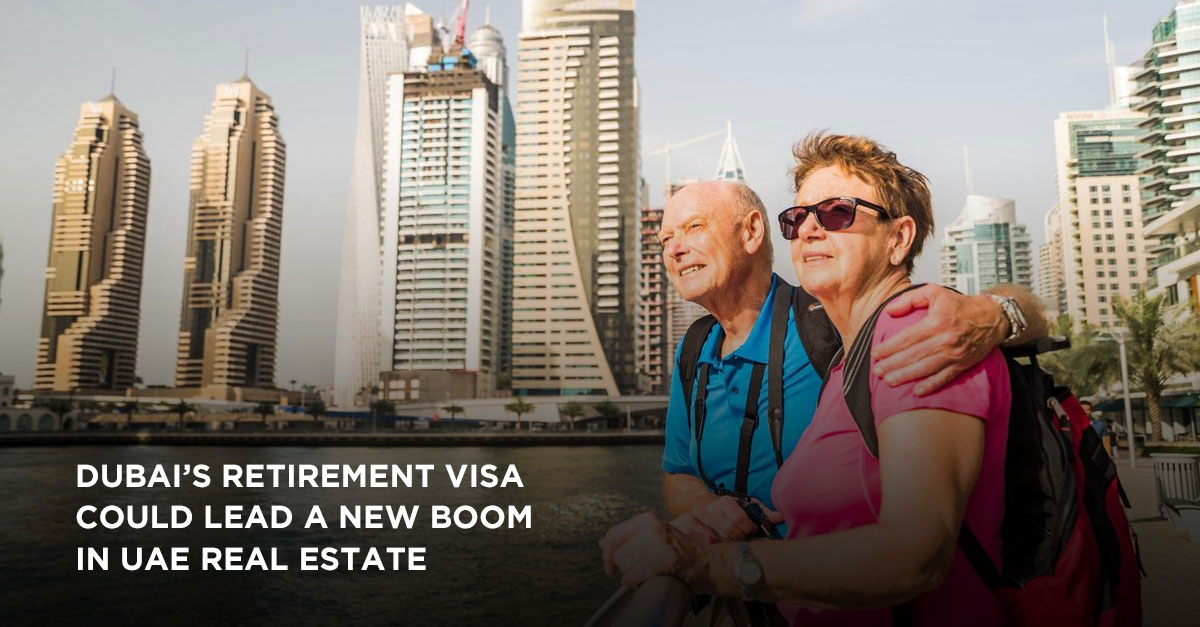Dubai’s retirement visa could lead a new boom in UAE real estate
To say that the UAE government has taken some very innovative steps to re-brand and re-position the Middle Eastern nation in recent years, would be an understatement. A series of bold and out of the ordinary initiatives have drawn a people-centric and future-ready roadmap for the UAE. Often, such measures have several secondary implications, in addition to the primary change in regulation or policy.
One such initiative is the announcement of a ‘retirement visa’ for expatriates aged 55 and over(1), which is expected to unlock several secondary positives for the economy, including creating a boom in UAE real estate. To be eligible for the visa, expatriates will need to be at least 55 years of age, have a valid UAE health insurance, and fulfill one of three additional conditions. The three conditions in question are: a monthly income of AED 20,000, AED 1 million in cash savings, or owning a property in Dubai that is valued at least AED 2 million.
After a fifteen day process, once the criteria have been fulfilled, a retired expatriate and their spouse can expect to receive a five-year visa, which can be extended online, at the end of that period. Initially, this retiree visa will only be available to those who are already part of the UAE’s sizable expatriate population. However, it is expected to be extended to other non-resident applicants over time, with additional qualification criteria.
Impact of the retiree visa, on UAE real estate
Of course, the visa criteria that has piqued interest within the Dubai real estate community, is one that relates to acquiring a local property valued at AED 2 million or more. Dubai’s luxury residential property segment already has a sterling reputation among international investors. The recent focus on making the city one of the most livable in the world – through people-centric policies, world class tech-enabled infrastructure and lifestyle enhancements – has made it an even more attractive investment destination. With the requirements for this retiree visa dovetailing perfectly with Dubai’s state of the art healthcare facilities and luxury retirement communities, the real estate industry expects a thriving new segment of buyers to enter the market.
In the past, expatriate residents had to rely on being sponsored by employers, or a family member who was employed, to extend their stay in the UAE. As a result, even expatriates who had been in Dubai for several decades had no regulatory framework under which they could continue to stay, after their retirement. Considering that expats form the majority population of the Emirates, the increased sense of permanence that the new visa regulations will give them, is likely to lead to them making more significant investments within the UAE, especially in the real estate sector.
An affluent generation will choose an optimal post-retirement lifestyle
The last of the ‘baby boomers’ are entering the proverbial final lap, in their careers. Traditionally taken to mean those born between 1946 and 1964, the youngest are just about 55 years old. Having experienced the most favourable world markets and growth rates of recent decades, this is a segment of the population that has accrued relatively higher wealth, than many other generations.
The number of people aged 60 or over, is expected to grow by 56%, to reach a figure of 1.4 billion, globally, between 2015 and 2030(2). This growth in this segment, accompanied by the purchasing power it represents, is being termed the ‘silver economy’. From driverless cars, to tech-assisted community living, a whole sub-section of the economy is expected to benefit from the influx of cash that this new generation of retirees will bring to the market.
The COVID-19 pandemic has introduced more incentives for this segment of the population to invest wisely in its twilight years. Considering the fact that the virus is most lethal for those beyond the age of 65(3), those already within this age-bracket, or approaching it, have a high incentive to live in regions that are able to contain the risk of infection, and give access to the highest quality of medical care. This priority alone is likely to influence a strong surge in expats who would prefer to remain in Dubai, rather than move to their home countries after retirement.
A perfect confluence of interests
Recent years have seen a sharp increase in the number of expatriates in the UAE(4). Even though there is a policy push to balance the population ratio, between Emiratis and expats, the diversification of the economy will continue to attract professionals from all around the globe, to the UAE.
The announcement of the retiree visa is a forward thinking measure, which will result in a win-win for expatriates, as well as the wider community. For expats, it allows them to continue a lifestyle that they have become accustomed to, during the course of their career. For the wider UAE economy, it represents a mechanism that will retain wealth accumulated within the Emirates, putting it to work to generate additional value for all.
- https://www.visitdubai.com/en/sc7/retire-in-dubai/plan-your-retirement/apply-for-your-retirement-visa
- http://www.globalagingtimes.com/aging/what-is-silver-economy
- https://www.cdc.gov/coronavirus/2019-ncov/need-extra-precautions/older-adults.html
- https://u.ae/en/information-and-services/social-affairs/preserving-the-emirati-national-identity/population-and-demographic-mix#:~:text=The%20UAE%20has%20more%20expatriate%20residents%20than%20UAE%20nationals.&text=From%204.1%20million%20in%202005,than%201%20million%20(947%2C947).




